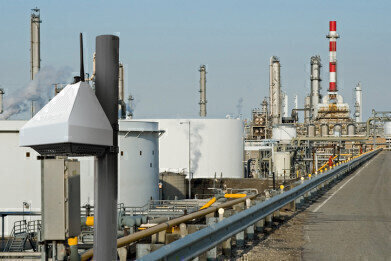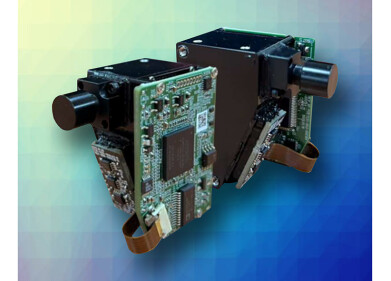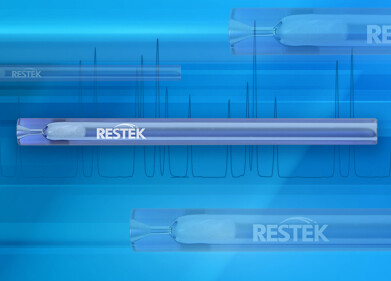Environmental Laboratory
How does smart technology keep air quality data accessible during lockdown?
Apr 21 2020
Technology is critical to so many essential services during the current global COVID-19 crisis, but it is also allowing local air quality to continue to be monitored, in real-time, across the world. Small sensor air quality monitors such as AQMesh pods, which can be easily mounted on lamp posts at road junctions, near schools or around industrial sites, can use cloud data storage to ensure that air quality information is stored and accessible even when staff are not able to visit equipment. With field staff budgets cut, air quality monitoring that does not require site visits is often preferable but in the current situation it is essential. Some small sensor systems require staff to visit the equipment to download data, which is not only a hidden cost but is currently a huge disadvantage given the restrictions on movement.
The small, low-power AQMesh pods can house sensors which measure a wide range of pollutants and environmental conditions in a single, compact unit. For example, AQMesh measures common pollutants, including those identified by the World Health Organisation as significantly damaging to human health: gases NO, NO2, O3, CO and SO2 and particulate matter PM1, PM2.5, PM4, PM10. Additionally, AQMesh records environmental measurements temperature, atmospheric pressure, relative humidity and has options for wind speed and direction, plus more specific measurements for different applications: gases H2S and CO2.
AQMesh uses the cellular phone network via a globally-enabled SIM card to send sensor output to a the secure AQMeshData cloud server. Here, sophisticated proprietary processing calculates air quality readings. The processing algorithms used are the result of nearly 10 years of analysing comparisons of AQMesh readings against readings from co-located equipment that complies with internationally recognised standards. These co-located comparison datasets are the reason for the high level of accuracy that AQMesh offers when used anywhere in the world, with no other manufacturer having access to such a broad range of comparable data and provable results. From the AQMesh server, users can securely access their air quality readings either by a website login on their laptop or phone, or by programming an API connection so data can be called automatically and integrated into their own system. Air quality data from AQMesh pods is not published publicly unless the data owner – or equipment purchaser / renter – chooses to do so, as data security is a crucial factor for AQMesh customers.
As well carrying out air quality analysis, air quality readings can be linked to automated pollution exceedance alerts, such as around road tunnels in the south of France, to display air quality to the public, such as the Breathe London project, or to manage air quality around industrial sites, such as mining facilities in South Africa.
Whilst the Internet of Things (IoT) and Smart City integration of sensors has helped to drive the growth of small sensor air quality networks it is important that traceability and data quality are retained. Air quality measurements are recognised as more challenging to achieve from small sensors than other measurements, particularly pollution gases, such as NO2 and O3, which are unstable in ambient air. Other systems have chosen to use artificial intelligence or machine learning to overcome these challenges, but it does not provide data traceability and integrity in the same way as the fixed version processing calculations used by AQMesh.
Luckily the chain of smart technology does not stop at the AQMesh server and many AQMesh customers are continuing to monitor air quality via their pods during these unprecedented times, which are undoubtedly having a dramatic impact on air quality around the world.
Amanda Billingsley, CEO of AQMesh manufacturer, Environmental Instruments Ltd, comments “We are as busy as ever, providing online support to our users. We continue to carry out remote support and proactive remote diagnostic work and data quality assurance for all our customers around the world, who are themselves able to review air quality data and take appropriate action whilst working from home. Additionally, our unique AQMesh pods were always designed to be as practical as possible and so they require very little ongoing maintenance – we simply advise replacing the electrochemical sensors every 2 years. This is another reason we are able to keep AQMesh networks up and running across the world during this crisis.”
Digital Edition
IET 34.2 March 2024
April 2024
Gas Detection - Biogas batch fermentation system for laboratory use with automatic gas analysis in real time Water/Wastewater - Upcycling sensors for sustainable nature management - Prist...
View all digital editions
Events
Apr 22 2024 Hannover, Germany
Apr 22 2024 Marrakech, Morroco
Apr 23 2024 Kuala Lumpur, Malaysia
Apr 23 2024 Kintex, South Korea
Apr 23 2024 Edmonton, AB, Canada


















